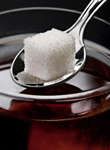 For those with a sweet tooth, a recent discovery made by researchers with the American Heart Association is likely to cause some dismay. It seems that people who consume a lot of added sugars in soft drinks and foods may have poor cholesterol profiles — which may lead to heart disease later in life.
For those with a sweet tooth, a recent discovery made by researchers with the American Heart Association is likely to cause some dismay. It seems that people who consume a lot of added sugars in soft drinks and foods may have poor cholesterol profiles — which may lead to heart disease later in life.
“Added sugars” are any sweeteners added to foods or drinks by either the manufacturer or you, the consumer. By reviewing data from the National Health and Nutrition Survey, researchers found that, out of 2,157 teenagers, the average daily consumption of added sugars was 119 grams (28.3 tsp or 476 calories), accounting for 21.4% of their total energy.
Study participants consuming the highest levels of added sugars had lower levels of high-density lipoprotein (HDL) cholesterol levels and higher levels of triglycerides and low-density lipoprotein (LDL) cholesterol. Teenagers with the highest levels of added sugar consumption at more than 30% of total energy had 49.5 milligrams/deciliter (mg/dL), compared to 54 mg/dL of HDL levels in those with the lowest levels of added sugar consumption — a nine-percent difference. Triglyceride levels in those with the highest consumption were 79 mg/dL compared to 71.7 mg/dL among the lowest, a 10% difference. Overweight or obese participants with the highest level of added sugar consumption had increased signs of insulin resistance.
This is the first study to assess the association of added sugars and heart disease risk. Previous studies indicate that the biggest culprits for added sugars to the diet are sugary beverages, such as sodas, fruit drinks, coffees and teas. The researchers note that, while most people are working hard to lower intake of saturated fats, awareness about added sugars is lagging far behind.
Before you drink or eat, check the labels of the foods you consume to become familiar with the amount of sugar in them. Better yet, avoid added sugars altogether and try some of these natural sweeteners: raw cane sugar; honey; molasses; fenugreek; and stevia.
